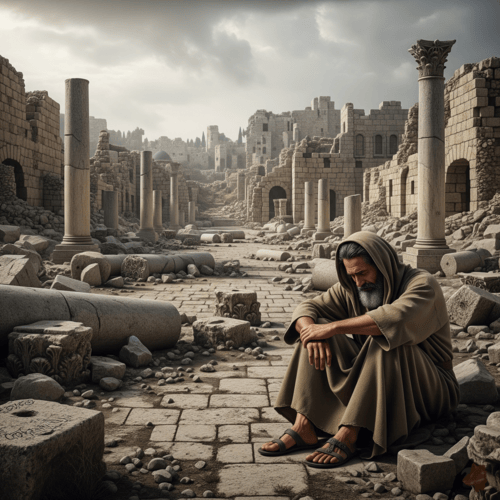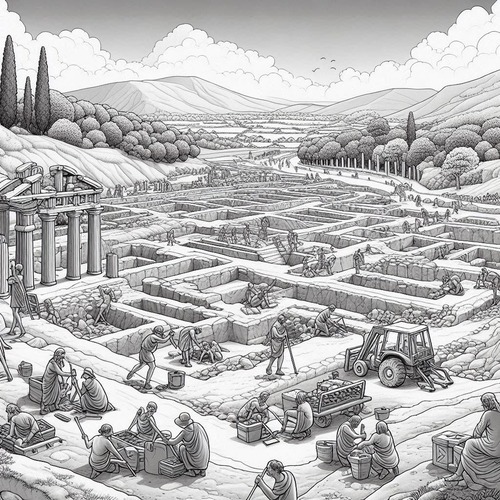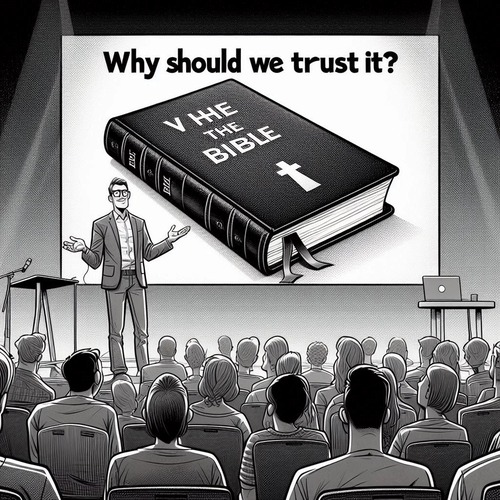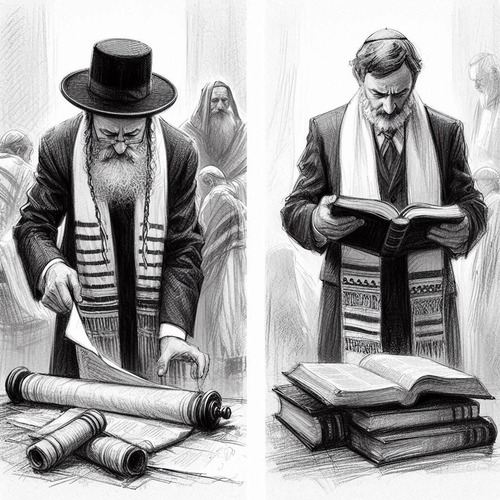Lamentations 3:24: What Does ‘The Lord Is My Portion’ Mean?
In the rubble of Jerusalem following its devastation, and surrounded by death and loss, the prophet Jeremiah penned some of the most heartwrenching poetry in Scripture. The book of Lamentations captures his anguish as he witnessed his beloved city destroyed and his people carried into exile. Yet in the middle of this darkness, we find one of the Bible’s most profound declarations of faith: “The Lord is my portion, says my soul; therefore I will hope in him” (Lamentations 3:24).
This single verse has sustained believers through their darkest hours. After losing his wife and children in India, missionary Henry Martyn called it his “anchor verse,” declaring, “Christ’s presence makes up for all other absences.” Adoniram Judson, enduring years in a Burmese prison, testified that discovering God as his sufficient portion was worth all his sufferings because it revealed treasures he never knew he possessed.
What is it about this verse that prompted such remarkable statements from men who lost everything? What does this famous declaration actually mean, and how can it speak to our struggles today?
UNDERSTANDING “PORTION” IN CONTEXT
To grasp Jeremiah’s radical statement, we must first understand what “portion” meant to an ancient Hebrew reader. The Hebrew word cheleq refers to an inheritance, a share, or an allotted part—specifically the guaranteed portion of land each tribe received when Israel entered the Promised Land. Your portion was your security, your identity, and your future rolled into one.
This concept appears throughout Scripture with profound theological significance. In Psalm 16:5, David declares, “Lord, you are my chosen portion and my cup; you hold my lot.” The psalmist in Psalm 119:57 echoes, “The Lord is my portion; I have promised to keep your words.” Most significantly, when God distributed the Promised Land, the Levites received no territorial inheritance. Instead, God told them, “I am your portion and your inheritance among the people of Israel” (Numbers 18:20). For the Levites, God himself replaced earthly inheritance.
JEREMIAH’S RADICAL DECLARATION IN REFORMED THEOLOGY
The Reformed tradition has long recognised Jeremiah’s declaration points to a fundamental truth about human nature and divine grace. Consider what this means through key Reformed doctrines:
God as our summum bonum (our highest good): True contentment and satisfaction can only be found in God himself, not in earthly possessions or circumstances. John Calvin emphasised the human heart remains restless until it finds its ultimate rest in God alone.
The all-sufficiency of God: God meets every spiritual need His people have. When Jeremiah lost everything—his city, his temple, his security—he discovered material losses cannot diminish our true inheritance in God. As Calvin wrote, when believers grasp this truth, they find freedom from the idolatry of earthly possessions.
Sola gratia (grace alone): Jeremiah’s declaration wasn’t based on his circumstances, his worthiness, or his spiritual performance. God becomes our portion through grace alone, not through what we earn or deserve. This grace remains constant whether we’re experiencing prosperity or devastating loss.
THE SOUL’S DECLARATION: PERSONAL APPROPRIATION
Note this: Jeremiah doesn’t simply state a theological fact—he says “my soul says” the Lord is my portion. This reveals the deeply personal nature of authentic faith:
- Heart religion over mere intellectual assent: True faith engages the whole person, not just the mind. The Holy Spirit works to make this truth real and personal to believers, transforming head knowledge into soul-deep conviction that sustains us through trials.
- Experiential knowledge of God’s faithfulness: This declaration emerges from lived experience of God’s character and promises. Through both blessings and hardships, believers come to know that earthly things are temporary, but their relationship with God endures forever.
- The role of trials in revealing true treasure: Often it takes loss and difficulty to show us what we truly value. Jeremiah’s circumstances stripped away everything external, revealing that his deepest security had always been in God himself.
LIVING OUT “THE LORD IS MY PORTION” TODAY
How do we cultivate this same heart attitude in our modern context? The Reformed tradition offers practical wisdom for making this truth real in daily life:
In financial uncertainty or job loss: When economic security crumbles, believers come to find their identity and worth in their union with Christ rather than their bank account or career status. This doesn’t minimise real struggles, but provides an unshakeable foundation beneath them.
Through health crises and family breakdown: Physical and relational losses can devastate us, but they cannot separate us from God’s love or diminish our spiritual inheritance. Reformed spiritual disciplines like regular meditation on God’s promises help believers maintain eternal perspective during temporal suffering.
During church struggles and disappointments: Even when religious institutions fail us, our portion remains secure in God himself. Cultivating gratitude for spiritual blessings—forgiveness, adoption, eternal life—helps us weather disappointments in earthly structures and relationships.
THE HOPE THAT SUSTAINS
When everything earthly is stripped away, the believer discovers what was always true: God alone satisfies. Jeremiah’s example shows us faith can persist through the darkest circumstances. His declaration points forward to Christ, who becomes our ultimate portion through His perfect life, sacrificial death, and glorious resurrection.
The question Jeremiah’s words pose to each of us is simple but searching: What is truly our portion? When losses come—and they will—what remains? Contentment isn’t about getting more, but about wanting God most. In Him, we have an inheritance that can never perish, spoil, or fade away. Our portion isn’t what we possess, it is Who possesses us.
THE LORD IS MY PORTION: RELATED FAQs
Didn’t John Calvin personally experience loss that influenced his commentary on this verse? Indeed, Calvin wrote extensively on Lamentations while enduring personal tragedies including the death of his only son and ongoing health struggles. He noted Jeremiah’s declaration becomes most precious to believers “when earthly props are removed and we learn to lean wholly upon God.” Calvin’s own losses deepened his appreciation for God as the believer’s unchanging portion.
- How does Lamentations 3:24 relate to the Puritan understanding of contentment? The Puritans, particularly Jeremiah Burroughs in The Rare Jewel of Christian Contentment, saw this verse as foundational to true satisfaction. Burroughs argued contentment isn’t about circumstances but about “the inward, quiet, gracious frame of spirit, freely submitting to and taking pleasure in God’s disposal.” Similarly, Thomas Watson wrote believers find their portion in God’s character, not His gifts.
- Is there a connection between “portion” language and the Lord’s Supper? Reformed theologians often connect the “portion” concept to communion, where believers receive Christ as their spiritual food. John Owen noted that just as Jeremiah declared God was his portion for sustenance, believers partake of Christ as their true bread. The Lord’s Supper becomes a tangible reminder to us that Christ Himself, not earthly bread, is our life-sustaining portion.
How did Charles Spurgeon, who faced depression, interpret “my soul says”? Spurgeon, who battled severe depression throughout his ministry, found deep comfort in the phrase “my soul says.” He preached that even when emotions fluctuate, the soul—the deepest part of our being—can still declare God as our portion. Spurgeon noted this wasn’t mere positive thinking but Spirit-wrought conviction that persists beneath the waves of circumstances and feelings.
- Why does Jeremiah use singular “portion” rather than plural “portions”? Commentators like Matthew Henry emphasise the singular nature of this declaration—God alone, not God plus other securities, constitutes our portion. Henry wrote believers must not divide their trust between God and earthly supports, but find their “all in all” in God Himself. This singularity distinguishes biblical contentment from worldly attempts to diversify our sources of security.
How does this verse relate to the Reformed doctrine of perseverance of the saints? Theologians like John Murray saw Lamentations 3:24 as evidence of persevering faith. Murray noted true believers, even in deepest trials, maintain their grip on God as their portion because God first gripped them. The verse demonstrates that saving faith endures precisely because it’s grounded in God’s unchanging character, not fluctuating circumstances.
THE LORD IS MY PORTION: OUR RELATED POSTS
- Does Grief Cancel Christian Joy? Or Can the Two Coexist?
- Purpose in Pain: Why Trust Providence When His Plan Is Hidden?
- The Joy of the Lord: Pursued by Many, Possessed by Few
- Christian Contentment: Discover True Joy in a ‘Never Enough’ World
- Christian Joy: Is It a Personal Choice or a Feeling? Or Neither?
- From Loneliness to Belonging: God Brings Us to Joyful Fellowship
Editor's Pick

The Nashville Statement: Why Affirm It Despite Media Backlash?
WHY DO REFORMED CHRISTIANS STAND BY THIS STATEMENT ON MARRIAGE AND GENDER? When the Nashville Statement was released in 2017, [...]

Who Is Belial? Solving The 2 Corinthians 6:15 Mystery
Belial: This name from the pages of Scripture chills the soul. Who is this mysterious figure Paul invokes in 2 [...]

Celibacy Or Castration: What Jesus Really Means in Matthew 19:12
One of Scripture's most shocking misinterpretations led theologian Origen to castrate himself in the third century. His tragic mistake? Taking [...]

Philippians 4:13: Did Paul Really Mean We Can Do ALL Things?
"I can do all things through Christ who strengthens me." It's on gym walls, graduation cards, and motivational posters everywhere. [...]

The Ordinary Means of Grace: Why Are They Indispensable?
ORDINARY MEANS FOR EXTRAORDINARY TRANSFORMATION What if God's most powerful work in believers' lives happens through the most ordinary activities? [...]

Is the Bible God’s Word? Or Does It Only Contain God’s Word?
The authority of Scripture stands at the crossroads of modern Christianity. While some argue the Bible merely contains God’s Word [...]

Will We Remember This Life in Heaven? What Isaiah 65:17 Means
"Will I remember my spouse in heaven? My children? Will the joy we shared on earth matter in eternity?" These [...]

From Empty to Overflow: The Abundant Life Jesus Promised
(AND WHY YOU SHOULDN’T SETTLE FOR LESS) We're surviving, but are we thriving? If we're honest, there's a gap between [...]

What Does Jesus Save Us From?
THREE BIBLE TRUTHS ABOUT SALVATION "Jesus saves." We’ve seen it on bumper stickers, heard it shouted at sporting events, maybe [...]

If God Wants Everyone Saved, Why Aren’t They?
THE REFORMED VIEW ON GOD’S DESIRE VS HIS DECREE The question haunts every believer who has lost an unbelieving loved [...]
SUPPORT US:
Feel the Holy Spirit's gentle nudge to partner with us?
Donate Online:
Account Name: TRUTHS TO DIE FOR FOUNDATION
Account Number: 10243565459
Bank IFSC: IDFB0043391
Bank Name: IDFC FIRST BANK






